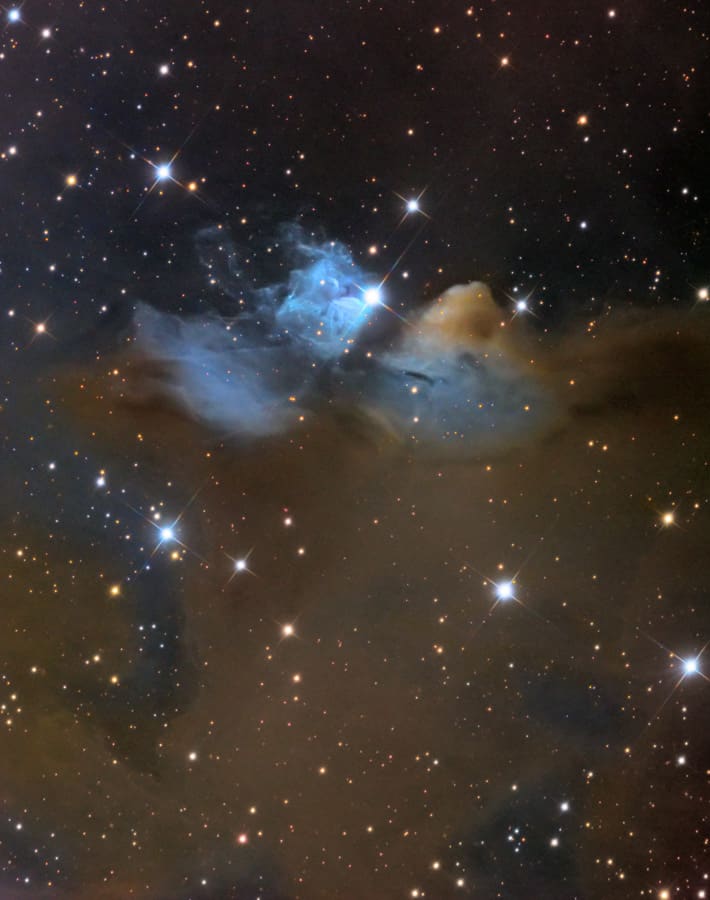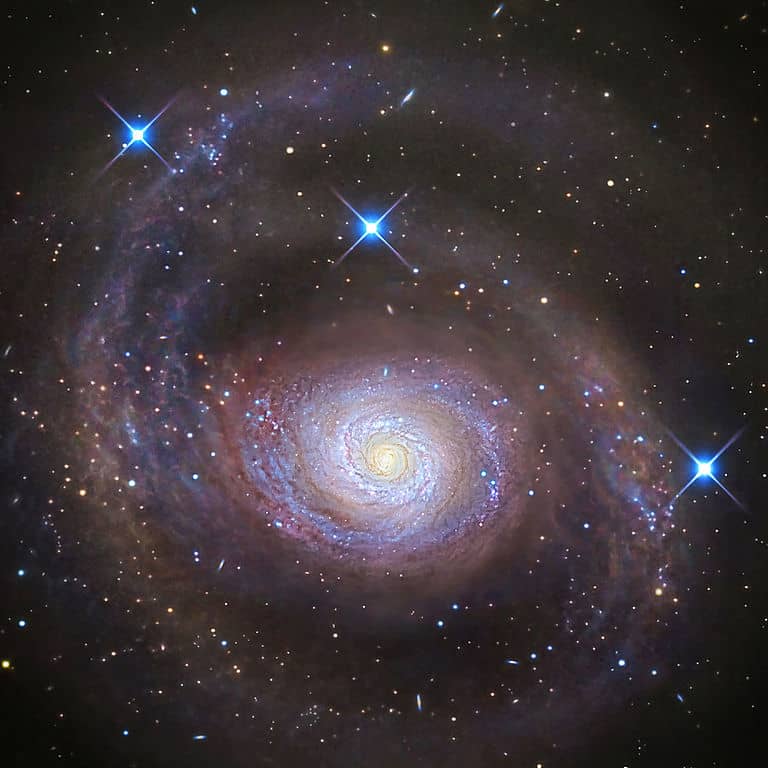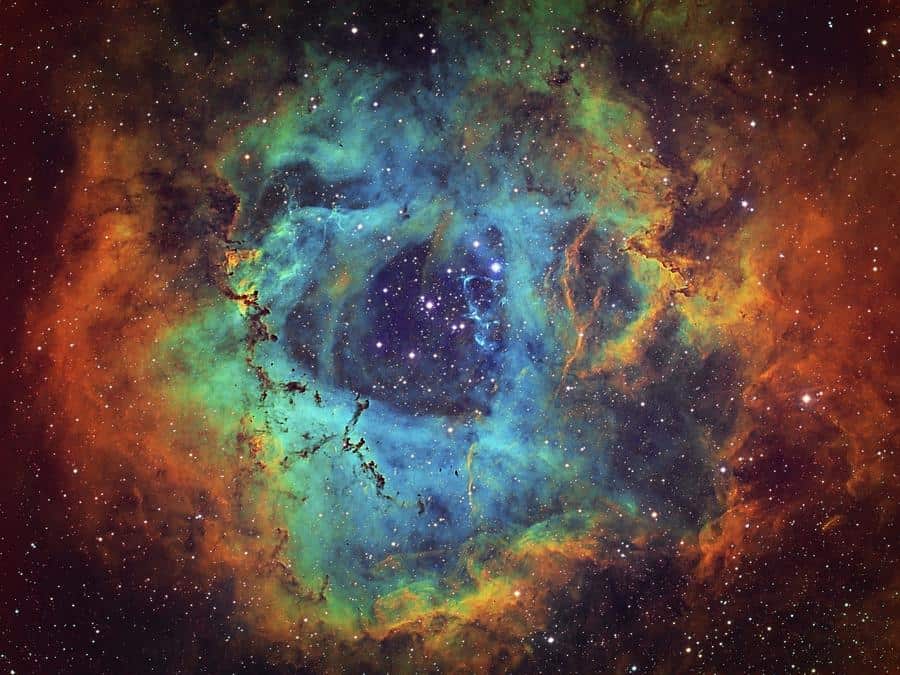Blog
vdB 24 is a reflection nebula in the constellation of Perseus. It is illuminated by the luminous and variable star ‘XY Per’, which is the bright star just below the blue nebulosity near the center of the image. vdB 24 is a faint, blue reflection nebula that lies roughly 1,140 light-years away in the constellation of Perseus, in the same galactic region as the California Nebula ( Sh2-220).

Terry John Bozzio (born December 27, 1950) is an American drummer best known for his work with Missing Persons and Frank Zappa.
He has been featured on nine solo or collaborative albums, 26 albums with Zappa, and seven albums with Missing Persons. He has been a prolific sideman, playing on numerous releases by other artists since the mid-1970s. He was inducted into the Modern Drummer Hall of Fame in 1997. His son and stepdaughter are also drummers; the latter, Marina, being a member of the band Aldious. Terry Bozzio was born on December 27, 1950, in San Francisco, California. He started at age 6 playing makeshift drum sets.
more...Johnny Frigo (December 27, 1916 – July 4, 2007) was an American jazz violinist and bassist. He appeared in the 1940s as a violinist before working as a bassist. He returned to the violin in the 1980s and enjoyed a comeback, recording several albums as a leader.
Frigo was born in Chicago and studied violin for three years beginning at age seven. In high school he started to play double bass in dance orchestras. In 1942 he played with Chico Marx‘s orchestra and performed a comedy routine on violin with Marx on piano. He entered the United States Coast Guard during World War II and played in a band on Ellis Island with Al Haig and Kai Winding.
After a brief turn at active service near the end of the war he moved to New Jersey. He toured with Jimmy Dorsey‘s band from 1945 to 1947, later forming the Soft Winds trio with Dorsey’s guitarist Herb Ellis and pianist Lou Carter. During this time he wrote the music and lyrics to “Detour Ahead”, which has been recorded by Billie Holiday, Sarah Vaughan, Ella Fitzgerald, Bill Evans, and Carola. During that time, he also wrote the sardonic swing tune “I Told Ya I Love Ya Now Get Out” which was recorded by June Christy and the Stan Kenton Orchestra. Chicago jazz vocalist Erin McDougaldrecorded the song 50 years later on her album The Auburn Collection (2004).
more...Willie Gary “Bunk” Johnson (December 27, 1879 – July 7, 1949) was a prominent jazz trumpeter in New Orleans. Johnson gave the year of his birth as 1879, although there is speculation that he may have been younger by as much as a decade.
Johnson received lessons from Adam Olivier and began playing professionally in Olivier’s orchestra. Johnson probably played a few adolescent jobs with Buddy Bolden, but was not a regular member of Bolden’s Band (contrary to Johnson’s claim). Johnson was regarded as one of the top trumpeters in New Orleans in the years 1905–1915, in between repeatedly leaving the city to tour with minstrel shows and circus bands.
After he failed to appear for a New Orleans Mardi Gras parade job in 1915, he learned that krewe members intended to do him bodily harm. So he left town, touring with shows and then by the early 1920s settling in New Iberia, Louisiana.
https://www.youtube.com/watch?v=ZWyjIq_TQzk&t=103s
more...The structure is similar to most Flamenco dances and can be broken down as follows:
- ENTRADA/SALIDA (ENTRANCE): The dancer enters the stage via marking steps (marcando)
- LLAMADA: This is the call for the singer to sing the first letra.
- FIRST LETRA: The singer sings 7-12 sets of 12 count phrases
- SECOND LETRA OR FALSETA: The Falsetta is a musical phrase or phrases that the guitarist has composed or improvises that the dancer interprets with choreography.
- ESCOBILLA: Several sets of 12 count footwork phrases
- SUBIDA/PALMAS/CHOREOGRAPHY that transitions into a BULERIAS. Usually, a REMATE/LLAMADA, a finish and a cue that are performed together in sequence, will occur here to call in the singer for the BULERIAS FINALE.
- BULERIAS – FINALE for all 12 count dances. Here, the Bulerías is a structured improvisation with set phrases, a set structure, and learned or improvised choreography.
more...
Messier 94 (also known as NGC 4736) is a spiral galaxy in the constellation Canes Venatici. It was discovered by Pierre Méchain in 1781, and catalogued by Charles Messier two days later. Although some references describe M94 as a barred spiral galaxy, the “bar” structure appears to be more oval-shaped. The galaxy has two ring structures. 16.01 million light years distant.

more...
John Scofield (born December 26, 1951), sometimes referred to as “Sco”, is an American jazz-rock guitarist and composer whose music includes bebop, jazz fusion, funk, blues, soul, and rock. He has worked with Miles Davis, Dave Liebman, Joe Henderson, Charles Mingus, Joey DeFrancesco, Herbie Hancock, Eddie Palmieri, Pat Metheny, Bill Frisell, Joe Lovano, Pat Martino, Mavis Staples, Phil Lesh, Billy Cobham, Medeski Martin & Wood, George Duke, Jaco Pastorius, John Mayer, Robert Glasper, and Gov’t Mule.
Scofield’s family left Ohio and moved to Wilton, Connecticut, where he discovered his interest in music. Educated at the Berklee College of Music, Scofield left school to record with Chet Baker and Gerry Mulligan. He joined the Billy Cobham/George Duke Band soon after and spent two years playing, recording, and touring with them. He recorded with Charles Mingus in 1976 and replaced Pat Metheny in Gary Burton‘s quartet.
In 1976 Scofield signed with Enja, which released his first album, John Scofield, in 1977. He recorded with pianist Hal Galper on Rough Housein 1978 and then on Galper’s album Ivory Forest (1980), where he played a solo rendition of “Monk’s Mood” by Thelonious Monk. In 1979 he formed a trio with his mentor Steve Swallow and Adam Nussbaum which, with drummer Bill Stewart replacing Nussbaum, became the signature group of Scofield’s career.
https://www.youtube.com/watch?v=zLhAgboAlZQ
more...George Edward “Butch” Ballard (December 26, 1918 – October 1, 2011) was an American jazz drummer who played with Louis Armstrong, Count Basie, and Duke Ellington. Ballard was born in Camden, New Jersey and grew up in the Frankford section of Philadelphia. As a child he followed American Legion parades near his home, focusing particularly on the drummer. When he was about 10 years old, Ballard’s father bought him a set of drums from a pawnbroker and he began to take lessons for 75 cents each. He got the nickname “Butch” after Machine Gun Butch, a character in the film The Big House (1930). He attended Northeast High School in Philadelphia. When he was 21, he married Jessie, for whom he bought a house in Philadelphia in 1950. At around 16 years old, Ballard listened to Herb Thornton‘s band at the Boys Club in Philadelphia. They let him play with them, and he was invited to join a band by a man who heard him. For the following few months, he carried his drums across Philadelphia to rehearse.
The Rosette Nebula (also known as Caldwell 49) is a large spherical H II region (circular in appearance) located near one end of a giant molecular cloud in the Monoceros region of the Milky Way Galaxy. The open cluster NGC 2244 (Caldwell 50) is closely associated with the nebulosity, the starsof the cluster having been formed from the nebula’s matter. The cluster and nebula lie at a distance of some 5,000 light-years from Earth) and measure roughly 130 light years in diameter. The radiation from the young stars excites the atoms in the nebula, causing them to emit radiation themselves producing the emission nebula we see. The mass of the nebula is estimated to be around 10,000 solar masses.

Don Gabriel Pullen (December 25, 1941 – April 22, 1995) was an American jazz pianist and organist. Pullen developed a strikingly individual style throughout his career. He composed pieces ranging from blues to bebop and modern jazz. The great variety of his body of work makes it difficult to pigeonhole his musical style.
Pullen was born on December 25, 1941, and raised in Roanoke, Virginia. Growing up in a musical family, he learned the piano at an early age. He played with the choir in his local church and was heavily influenced by his cousin, Clyde “Fats” Wright, who was a professional jazz pianist. He took some lessons in classical piano and knew little of jazz. At this time, he was mainly aware of church music and the blues.
Pullen left Roanoke for Johnson C. Smith University in North Carolina to study for a medical career but soon he realized that his true vocation was music. After playing with local musicians and being exposed for the first time to albums of the major jazz musicians and composers he abandoned his medical studies. He set out to make a career in music, desirous of playing like Ornette Coleman and Eric Dolphy.
In 1964 he went to Chicago for a few weeks, where he encountered Muhal Richard Abrams‘ philosophy of making music. He then headed for New York, where he was soon introduced to avant-garde saxophonist Giuseppi Logan, who invited Pullen to play piano on his two albums, Giuseppi Logan (ESP, October 1964) and More (ESP, May 1965), both exercises in structured free playing.
https://www.youtube.com/watch?v=XMwA0T_ZYag
more...Charles “Don” Alias (December 25, 1939 in New York City – March 28, 2006 in New York City) was an American jazz percussionist.
Alias was best known for playing congas and other hand drums. He was, however, a capable drum kit performer: for example, Alias played drums on the song “Miles Runs the Voodoo Down” from trumpeter Miles Davis‘s album Bitches Brew (1969) when neither Lenny White nor Jack DeJohnette was able to play the marching band-inspired rhythm requested by Davis.
Alias performed on hundreds of recordings and was perhaps best known for his associations with Miles Davis and saxophonist David Sanborn, though he also performed or recorded with the group Weather Report, singer Joni Mitchell, pianist Herbie Hancock, the Brecker Brothers, Jaco Pastorius, Pat Metheny, Nina Simone and many others. Alias was born in New York City and arrived in Boston in the early 1960s intending to study medicine but, after playing congas in a number of local bands, made an abrupt career switch.
more...Christophe Kenner (December 25, 1929 – January 25, 1976) was a New Orleans R&B singer and songwriter, best known for two hit singles in the early 1960s, which became staples in the repertoires of many other musicians.
Born in the farming community of Kenner, Louisiana, upriver from New Orleans, Kenner sang gospel music with his church choir. He moved to New Orleans when he was in his teens. In 1955 he made his first recordings, for a small label, Baton Records, without success. In 1957 he recorded his “Sick and Tired” for Imperial Records. Fats Domino covered it the next year, and his version became a hit. “Rocket to the Moon” and “Life Is Just a Struggle”, both cut for Ron Records, were other notable songs Kenner recorded in this period.
Moving to another New Orleans label, Instant (which was initially called Valiant before they discovered the name was already in use), he began to work with the pianist and arranger Allen Toussaint. In 1961, this collaboration produced “I Like It Like That“, his first and biggest hit, peaking at number 2 on the Billboard Hot 100 chart (covered in 1965 by the Dave Clark Five), and “Something You Got” (covered by Wilson Pickett, Alvin Robinson, the Ramsey Lewis Trio, Johnny Rivers, Chuck Jackson, Earl Grant, Maxine Brown, Fats Domino, Bobby Womack, The Moody Blues, the American Breed, Fairport Convention, Bruce Springsteen and Jimi Hendrix (1966)). “I Like It Like That” sold over one million copies and was awarded a gold disc by the Recording Industry Association of America. In 1963 he produced his most enduring song, “Land of 1000 Dances“, which was covered by various artists, including Cannibal & the Headhunters, Fats Domino, Thee Midniters, Wilson Pickett, the Action, and Patti Smith.
Kenner continued to record for Instant and for other small local labels, including many of his lesser-known songs from the 1960s, such as “My Wife”, “Packing Up” and “They Took My Money”. He released an album, Land of 1000 Dances, on Atlantic Records in 1966; it was reissued on CD by Collectors’ Choice in 2007. In 1968 Kenner was convicted of statutory rape of a minor and spent three years in Louisiana’s Angola prison. Kenner died from a heart attack in 1976, at the age of 46, triggered by alcoholism.
more...
Cabell “Cab” Calloway III (December 25, 1907 – November 18, 1994) was an American jazz singer, dancer, and bandleader. He was associated with the Cotton Club in Harlem, New York City, where he was a regular performer.
Calloway was a master of energetic scat singing and led one of the United States’ most popular big bands from the start of the 1930s to the late 1940s. Calloway’s band included trumpeters Dizzy Gillespie and Adolphus “Doc” Cheatham, saxophonists Ben Webster and Leon “Chu” Berry, New Orleans guitarist Danny Barker, and bassist Milt Hinton.
Calloway had several hits in the 1930s–1940s, becoming known as the “Hi-de-ho” man of jazz for his most famous song, Minnie the Moocher, recorded in 1931. He also made several stage, film, and television appearances until his death in 1994 at the age of 86. He influenced later singers such as Michael Jackson and various hip-hop performers. Calloway was the first African American musician to sell a million records from a single song and to have a nationally syndicated radio show. He is in the Grammy Hall of Fame and received the Grammy Lifetime Achievement Award.
Calloway was born in Rochester, New York, on Christmas Day in 1907 to an African American[3] family. His mother, Martha Eulalia Reed, was a Morgan State College graduate, teacher, and church organist. His father, Cabell Calloway Jr., graduated from Lincoln University of Pennsylvania in 1898, and worked as a lawyer and in real estate. The family moved to Baltimore, Maryland, when Calloway was 11.
more...Oscar Frederic Moore (December 25, 1916 – October 8, 1981) was an American jazz guitarist known for his ten years with the King Cole Trio, a working jazz ensemble that included pianist and singer Nat King Cole.
Moore was born in Austin, Texas, the son of a blacksmith and his wife. By the time of the 1930 United States Census, the Moore family had moved to Phoenix, Arizona where Oscar eventually began performing with his older brother Johnny, who played both trombone and guitar. The younger Moore relocated to Los Angeles, California by mid-1936. In September of the following year, he participated in his first recording session as part of the Jones Boys Sing Band for Decca Records, led and arranged by Leon René. The group attracted some local attention via radio spots and two short films for MGM directed by Buster Keaton. Sometime the same month that Oscar first recorded with the Jones Boys, he accompanied pianist and vocalist Nat King Cole in an extended engagement at Bob Lewis’s Swanee Inn, North La Brea, Hollywood. He would end up spending ten years with Cole in the piano-guitar-bass trio format that influenced Art Tatum, Oscar Peterson, Ahmad Jamal, and countless cocktail combos throughout the jazz world. Initially the group was collective unit, but the group was re-structured after experiencing chart success with Capitol Records in the mid-1940s. This change in how the group was managed, as well as life on the road contributed to Moore’s eventual departure from the musical organization, as he intimated to journalist John Tynan ten years after her left the group.
In addition to the commercial success enjoyed by the Trio, Moore was singled out for praise during the group’s heyday. He placed or topped polls in Downbeat, Metronome, and Esquire magazines from 1943 through 1948. Even pianist Art Tatum professed his admiration for Moore in a 1944 magazine interview.
After he left the King Cole Trio in October 1947, he joined his brother in Johnny Moore’s Three Blazers as a featured member of that group into the early 1950s. Oscar formed his own working trio in 1952 and was active around the Los Angeles area. He recorded sessions both under his own leadership and as a sideman throughout the 1950s, but his career as a performer and recording artist ended abruptly at the decade’s conclusion at which time he left the music industry. He returned to the recording studio in 1965 to record a tribute to the then recently-deceased Cole and again resurfaced in the 1970s briefly backing Helen Humes. Moore died of a heart attack in Clark, Nevada, in 1981.
https://www.youtube.com/watch?v=U_dX_n83lag
more...https://www.youtube.com/watch?v=KrkngmrCmaA
more...More Posts
- Howard Rumsey
- World Music with Osei Korankye
- Daily Roots with the Wailing Souls
- Club Calabash Performance
- Surviving the Pandemic and Realizing Racial Justice
- The Cosmos with the Moon and the International Space Station
- Arturo Sandoval
- Ray Coniff
- John Philip Sousa
- Flamenco Fridays with Justo Fernández “El Tuto
- Daily Roots with Bob Marley
- Surviving the Pandemic and Realizing Racial Justice
- The Cosmos with M78
- Neil Cowley
- Art Garfunkel
- Red Wooten
- World Music with Debashish Bhattacharya
- Daily Roots with Dennis Brown
- Surviving the Pandemic and Realizing Racial Justice
- The Cosmos with HBC 672
